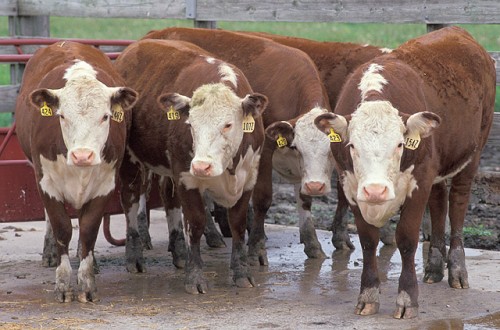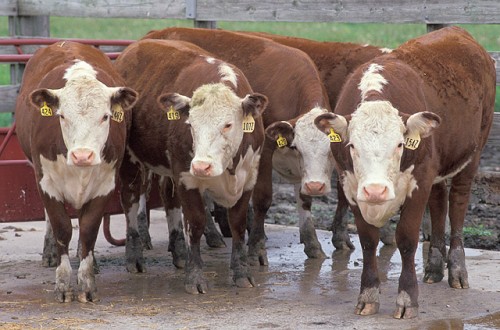Send your question to Umbra!
Q. Dear Umbra,
Why is it eating less beef can save water? In addition, if we skip meat to save water, will that affect our health? Besides beef, what other food or drinks use a lot of water to produce and process?
Thanks!
Jocey
A. Dearest Jocey,
Wow, you meat-eaters sure are hungry for information — check out my colleague Lou Bendrick’s recent exploration of beef and methane.
 Drink to me only with thine tasty thighs.USDA.govAs for your question: It takes a lot of water to grow and feed a large mammal, and yet more water to cut it up into small pieces and clean up the mess. Water use in beef production includes the water the cattle drink, the water used to clean their housing, the water used to grow their grain, water evapo-transpired from any grass they eat, and water used in the slaughter process. Water impacted by beef production is any water affected by the runoff from beef farms — runoff that can include pathogens, heavy metals, and nutrient contaminants such as nitrogen.
Drink to me only with thine tasty thighs.USDA.govAs for your question: It takes a lot of water to grow and feed a large mammal, and yet more water to cut it up into small pieces and clean up the mess. Water use in beef production includes the water the cattle drink, the water used to clean their housing, the water used to grow their grain, water evapo-transpired from any grass they eat, and water used in the slaughter process. Water impacted by beef production is any water affected by the runoff from beef farms — runoff that can include pathogens, heavy metals, and nutrient contaminants such as nitrogen.
Agriculture worldwide uses 70 percent of the world’s fresh water. Obviously we have to eat, and beef is not the only agricultural product to use water. It’s just that beef, particularly industrial beef, represents a double hit: it’s fed grain that’s grown and watered just to produce the meat. That cropland could have feasibly produced a protein crop that wouldn’t have the total final water use (and water contamination) of beef.
How much water is needed to raise a certain piece of beef is a little hard to parse. Reports sponsored by the California Beef Council come in at 3,682 liters per kilogram; the President of the Pacific Institute estimates 15,000 to 70,000 liters per kilogram. Other than beef, other meats would be the main users of water. Many processed items use a surprising amount of water, including nuclear power, plastic bottles, and Coca-Cola.
Skipping conventionally raised beef will indeed affect your health — in a positive way.
Water availability is a growing issue worldwide, but water use is not yet as quantified for consumer items or daily activities — or beef production — as are climate change impacts. I think if you focus your eating preferences based on climate change impacts (eating lower on the food chain, not eating heavy things shipped from far away, eating fewer processed foods …), you’ll be doing well by the world’s water supply.
Moistly,
Umbra




